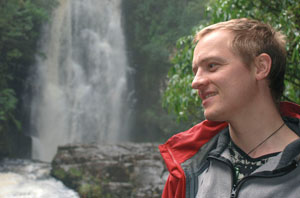
 Dr Bastiaan Star
Dr Bastiaan Star
PhD
Bastiaan Star remembers the first papers he read when he embarked on his PhD in population genetic theory. “They were completely incomprehensible. I could not understand them at all.”
Bastiaan had entered the PhD programme with qualifications in marine biology and several years' experience working in the Dutch fisheries industry. Deciding to pursue a wholly theoretical PhD drew him into a whole new world of mathematics and computer programming – all of which he taught himself.
“I felt out of my league for a while. I realised there were some very smart people making contributions in this field.”
But having completed his PhD in just over three years, Bastiaan offers a vision of life from the other side. In fact, he describes his PhD as having been “very smooth, and not really very stressful.”
He puts his success down to a mixture of a “supportive, approachable” supervisor, like-minded PhD colleagues, fascination with his subject and a good dose of grim determination. And on the up side, he says he's pleased to have gained so much knowledge, and so many new skills.
To others who might be feeling daunted, Bastiaan advises, “Make sure you take enough time off to relax, enjoy life and keep trying! Don't be afraid of hard questions, or hard concepts. The best ideas often arise when you're relaxed.”
Just learning the jargon is a necessity for most complex concepts. And often, suggests Bastiaan, it's a case of mind over matter – the secret is not letting yourself become overwhelmed by how difficult ideas seem. “If you're scared of something, it's harder to understand it. Just work your way through the ideas, step by step, and the logic should emerge.”
Bastiaan says that faced with the enormous new field of research he had entered, he felt incapable of producing a literature review. Instead, he went straight into writing research papers, all published in the same journal, and each looking at a different aspect of his research problem. These eventually became the chapters of his thesis. “Taking this approach was a huge boost to my productivity, and my confidence. I felt like I was actually achieving something!”
Furthermore, because all the papers were peer reviewed, Bastiaan says the process removed much of the stress at the end of the thesis.
Now, Bastiaan will be putting his knowledge to use as a postdoctoral fellow, investigating the connection between genetics and marine ecology using cod populations in Norway as a model system. He comments that one of the advantages of completing a PhD is that everything else in life seems relatively easy. “I have learned to adapt to a demanding situation before and this time, I don't have to write a thesis at the end!”
Bastiaan's thesis has been formally recognised by the Division of Sciences as being of exceptional quality.
